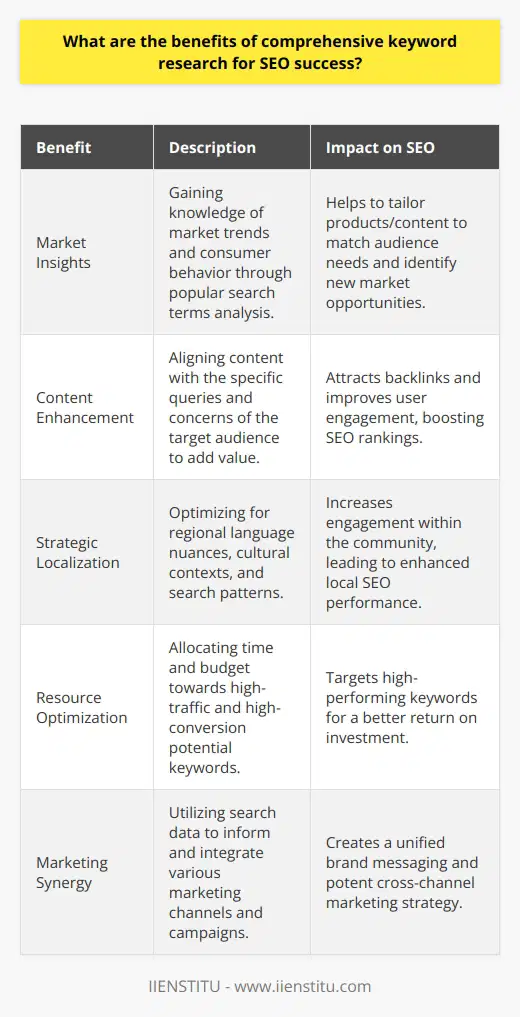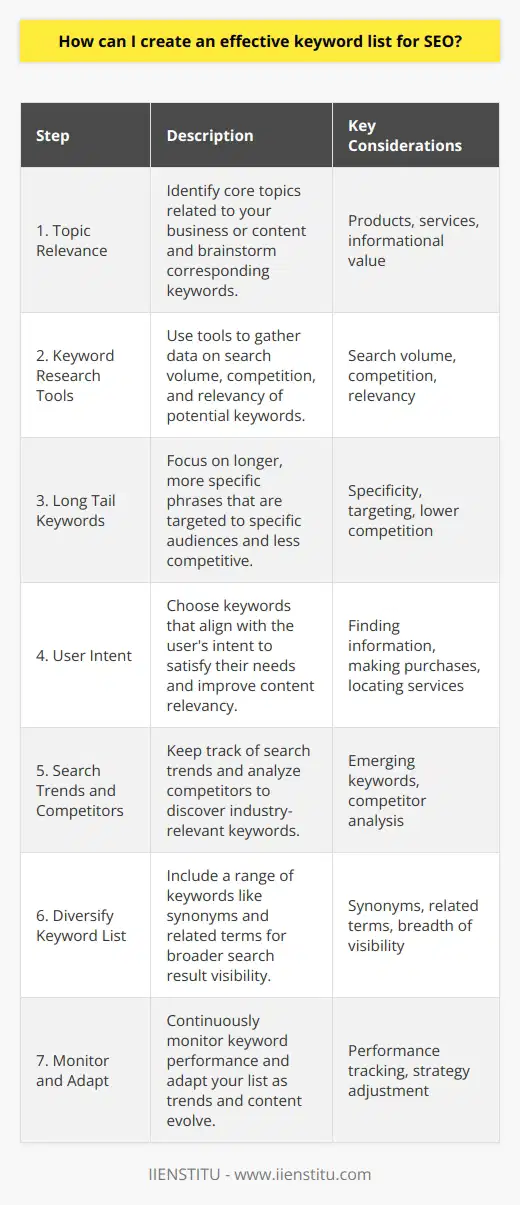
This article discusses the importance of comprehensive keyword research for online marketing strategies. It explains why it is essential, considerations when creating an initial keyword list, profiling user needs, and traditional search engine ranking practices. Comprehensive keyword research allows businesses to understand the words and phrases potential customers use when searching for products or services related to their business, optimize their website for search engine rankings, identify new opportunities for marketing and advertising campaigns, and identify potential competitors.
Introduction
Why Is Comprehensive Keyword Research Important?
Considerations When Creating Your Initial Keyword List
Profiling User Needs
Traditional Search Engine Ranking Practices
Introduction
Keyword research is a crucial part of any successful online marketing strategy. It involves understanding potential customers' words and phrases when searching for products, services, or information related to your business. Comprehensive keyword research is essential for optimizing your website for search engine rankings and ensuring that your target audience can find your website when they search for the products or services you offer. This article will discuss why comprehensive keyword research is essential, considerations when creating your initial keyword list, profiling user needs, and traditional search engine ranking practices.
Why Is Comprehensive Keyword Research Important?
Comprehensive keyword research is essential because it allows you to identify the words and phrases used by your target audience when searching for products or services related to your business. By understanding the words and phrases that potential customers use, you can optimize your website for search engine rankings and ensure that your target audience can find your website when they search for the products or services you offer. Additionally, comprehensive keyword research allows you to identify new opportunities for marketing and advertising campaigns, as well as identify potential competitors.
Considerations When Creating Your Initial Keyword List
When creating your initial keyword list, an excellent first step is listing all your products, services, and brands. However, the next step should be to consider other words that would appear before and after them in a search query. This involves thinking about the larger topical context around your keywords and their relationships to other topics. Additionally, you should consider synonyms and related terms, as well as misspellings and variations of the terms you are researching.
Profiling User Needs
To help with that profile, all the user needs related to your products and services. How does the user think about what they want? What initial queries might they start with, and how will they progress as they move through the purchase funnel? As you perform your keyword research, keep all of these considerations in mind and make a plan to address as many of these user needs as possible.
Traditional Search Engine Ranking Practices
Traditionally, search engines have ranked pages based on the similarity between the user’s search query and the content they see on relevant websites. If a search query appears verbatim in the content of a web page, the page will generally rank higher in the search engine results. Additionally, search engines may use other factors, such as the number of inbound links, page speed, and other indicators, to determine the relevance of a page to a search query.
Conclusion
Comprehensive keyword research is an essential part of any successful online marketing strategy. It allows you to identify potential customers' words and phrases when searching for products, services, or information related to your business. Additionally, comprehensive keyword research will enable you to identify new opportunities for marketing and advertising campaigns, as well as identify potential competitors.
When creating your initial keyword list, consider other words that would appear before and after them in a search query, as well as synonyms and related terms, misspellings, and variations of the terms you are researching. Finally, consider profiling user needs and traditional search engine ranking practices to ensure that your target audience can find your website when they search for the products or services you offer.
Comprehensive keyword research is the foundation of successful SEO.

Frequently Asked Questions
The Good, the Bad, and the Ugly of Social Media
In conclusion, the blog post has shown that social media can be used in many positive and negative ways. It has highlighted that, on the one hand, it can be used to connect people and create a sense of community. Still on the other, it can be used to spread false information and create confusion. Therefore, it is essential to use social media with caution and think carefully before sharing anything online. Ultimately, it is up to the individual user to make sure they are using social media responsibly to benefit themselves and others.

What are the benefits of comprehensive keyword research for SEO success?
Keyword research is essential for SEO success, as it allows marketers to identify and target relevant terms that will drive organic search engine traffic and increase visibility. Comprehensive keyword research considers factors such as search volume, competition, and relevance to the target audience. By conducting a thorough keyword research analysis, businesses can benefit from higher rankings, more organic traffic, and increased conversions.
One of the primary benefits of comprehensive keyword research is increased visibility. Businesses can increase their search engine rankings by targeting the right keywords, leading to more organic traffic. Not only is this beneficial for increasing website visibility, but it can also help to generate more leads and potential customers. Additionally, comprehensive keyword research can help businesses identify more competitive keywords and rank higher in the SERPs, which can lead to better results and conversions.
Another benefit of comprehensive keyword research is improved relevancy. By targeting relevant keywords, businesses can ensure that they are targeting the right audience and that the content they produce is relevant to their target audience. This can lead to better engagement and increased conversions, as visitors are more likely to take the desired action when the content is relevant to their needs. Additionally, comprehensive keyword research can help businesses create content that is more likely to rank higher in the SERPs, as it can be tailored to the specific search terms most likely to be used by their target audience.
Finally, comprehensive keyword research can be beneficial for marketing campaigns. By targeting relevant keywords, businesses can improve their campaigns’ effectiveness, as they can ensure that their target audience will see the content they are creating. Additionally, targeting relevant keywords can help businesses create campaigns more likely to convert, as visitors are more likely to take action when the content is tailored to their needs.
In conclusion, comprehensive keyword research is an essential part of SEO success. By conducting a thorough keyword research analysis, businesses can benefit from higher rankings, more organic traffic, improved relevancy, and increased conversions. Comprehensive keyword research can be a powerful tool to increase visibility, engagement, and conversions and should not be overlooked when it comes to SEO success.

How can I create an effective keyword list for SEO?
When writing content for SEO purposes, one of the most important steps is to create an effective keyword list. Keywords are the terms people use to search for content, and by choosing the right keywords, you can ensure that the right people see your content. This article will discuss some of the best practices for creating an effective keyword list for SEO.
First, it is essential to understand the different types of keywords. Broad keywords are the most generic terms related to your topic and are typically used by many people. On the other hand, long tail keywords are more specific terms that are used by fewer people but tend to be more targeted and, therefore, more likely to generate leads. To create an effective keyword list, it is essential to identify both types of keywords and use them appropriately.
Second, it is essential to research keyword trends and determine which terms are currently popular. This can be done by looking at search engine results pages (SERPs) and seeing which words are used most. Additionally, tools such as Google Trends can help you identify which keywords are trending and can be used to create an effective keyword list.
Third, it is essential to use a variety of keywords. Using a combination of keywords will help ensure that a wide range sees your content of people. Additionally, it is essential to consider the user's search intent when choosing keywords. What type of content are they looking for? What questions are they trying to answer? By understanding the user's search intent, you can ensure that the right people see your content.
Finally, it is essential to monitor the performance of your keywords. This can be done by using tools such as Google Analytics to track the performance of your keywords and identify which ones are generating the most traffic. Additionally, it is essential to regularly update your keyword list to ensure that the right people are seeing your content.
In conclusion, creating an effective keyword list for SEO is essential to creating successful content. By understanding the different types of keywords, researching keyword trends, using a variety of keywords, and monitoring the performance of your keywords, you can ensure that the right people see your content.

What is a comprehensive SEO strategy and how does it contribute to a website's success?
Comprehensive SEO Strategy Defined
A comprehensive SEO strategy is a well-rounded approach to optimizing a website for search engines, with a primary focus on improving its visibility, ranking, and visitor traffic. This strategy involves various on-page and off-page tactics designed to boost the website's overall relevance, authority, and user experience.
On-Page Optimization Techniques
On-page optimization involves improvements made directly on the website itself. These techniques include keyword research and usage, meta tag optimization, URL structure, header tags, content optimization, and internal linking. Keyword research is essential to identify the most relevant terms that users search for, while incorporating those keywords strategically into the site content improves the site's relevance for search engines. Meta tags, header tags, URL structure, and internal linking all aid search engines in understanding and indexing the site effectively.
User Experience Focus
A crucial aspect of a comprehensive SEO strategy is its focus on user experience. This includes designing the site for ease of navigation, fast load times, mobile-responsiveness, and having rich, valuable content. Ensuring an excellent user experience promotes longer visits, lower bounce rates, and higher engagement, which are favorable factors for search engine algorithms.
Off-Page Optimization Techniques
Off-page optimization techniques refer to actions that happen outside the website but significantly influence its search engine performance. Techniques include building high-quality backlinks, social media marketing, and content marketing. Backlinks act as 'votes of confidence' from other websites, while social media aids in brand awareness and drives more organic website traffic. Content marketing focuses on the creation and distribution of valuable, relevant, and consistent content to attract, engage, and retain a target audience.
Analyzing and Adjusting
Finally, a comprehensive SEO strategy must include regular analysis and adjustments based on performance metrics. By using tools such as Google Analytics, webmasters can track user behavior, engagement, and results to identify possible areas of improvement. Continual assessment and optimization ensure that a website stays competitive in search engine rankings, maximizes its potential for success.
In conclusion, a comprehensive SEO strategy is vital for a website's visibility, authority, and ultimately its success. By employing on-page and off-page optimization techniques, prioritizing user experience, and continually analyzing and adjusting the strategy, a website can significantly improve its search engine performance, attract more visitors, and achieve its digital goals.

Which research methods are most important for achieving SEO success and why?
Keyword Analysis and Targeting
Achieving Search Engine Optimization (SEO) success requires implementing a strategic approach that encompasses a variety of research methods. Among these, keyword analysis and targeting stand as crucial components in the quest for improved search rankings. By identifying the most fitting terms and phrases, content creators can improve the visibility of their blog posts to attract more organic traffic and achieve higher search engine rankings.
Competitor Analysis
Another essential research method involves conducting a thorough analysis of competitors within the same niche. Examining their content, keyword choices, and ranking enables content creators to uncover optimization strategies that work, as well as opportunities for outperforming rivals. Keeping a close eye on competitors' performance and practices empowers them to craft more compelling and relevant blog posts that fulfill the needs and preferences of the target audience.
User Experience Optimization
Along with the previously mentioned methods, the importance of focusing on user experience (UX) optimization must not be neglected. A seamless and enjoyable UX has a direct impact on SEO success, as search algorithms prioritize websites that offer high-quality, engaging content and easy navigation. Implementing best practices, such as responsive design and faster page load times, helps to foster audience satisfaction and loyalty, leading to better SEO performance.
Backlink Profile Development
Establishing a robust backlink profile acts as yet another critical research method indispensable to SEO success. By securing high-quality inbound links from authoritative, relevant sources, content creators can enhance the credibility and visibility of their blog posts. Building such links requires the identification of worthwhile prospects, outreach efforts, and careful monitoring of backlinks to maintain a healthy profile that bolsters SEO outcomes.
Content Gap Analysis
Finally, conducting a comprehensive content gap analysis supports the discovery of topics and ideas that have not been covered by competitors. This research method enables content creators to address the unmet information needs of their target audience while simultaneously presenting additional opportunities for keyword targeting. By consistently producing unique, valuable content that fills existing gaps, content creators naturally enhance their blog's appeal to audiences and search engines alike.
In conclusion, to achieve SEO success in blog posts, it is essential to employ research methods such as keyword analysis and targeting, competitor analysis, user experience optimization, backlink profile development, and content gap analysis. These approaches provide content creators with the necessary insights to increase their blog's visibility, authority, and relevance, ultimately resulting in enhanced search rankings and increased organic traffic.

What is the best keyword research technique in SEO for maximizing search engine rankings?
Understanding Keyword Research Techniques
To maximize search engine rankings effectively, the best keyword research technique in Search Engine Optimization (SEO) is utilizing a combination of relevant keywords, long-tail keywords, and search intent analysis.
Relevance of Keywords
The first step to successful keyword research is finding relevant keywords. This involves targeting specific keywords that accurately represent the content of the blog post and resonate with the target audience, which helps increase its search engine visibility. This approach allows the blog post to attract more organic traffic, as well as maintain a strong ranking in search engine results pages (SERPs).
Long-tail Keywords
Incorporating long-tail keywords into the blog post is another effective keyword research technique. Long-tail keywords are phrases with three or more words that are highly specific to the blog post's topic. These keywords tend to have lower search volumes but higher conversion rates, as they target a narrower audience searching for more specific information. By focusing on long-tail keywords, a blog post can rank higher in SERPs and attract more relevant traffic, ultimately leading to higher user engagement.
Search Intent Analysis
Analyzing search intent is a crucial aspect of keyword research. It involves understanding the reason behind a user's query and identifying the type of content they are seeking. This information helps align the blog post with the user's expectations, resulting in improved click-through rates and user satisfaction. By catering to the user's search intent, blog posts can rank higher in SERPs and improve overall site authority.
Combining these Techniques
Ultimately, employing a combination of these three methods – relevant keywords, long-tail keywords, and search intent analysis – serves as the most effective keyword research technique for maximizing search engine rankings in SEO. By continually refining and updating keyword strategies in line with current search trends and user behavior, blog posts can maintain high rankings on SERPs and drive consistent organic traffic to the website.



